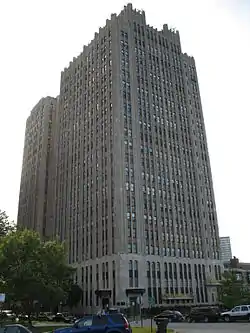| Powhatan Apartments | |
|---|---|
 May 28, 2007 (Memorial Day) | |
| General information | |
| Location | 4950 S. Chicago Beach Dr. Chicago, Illinois |
| Coordinates | 41°48′17″N 87°35′03″W / 41.8046°N 87.5843°W |
| Construction started | 1927 |
| Completed | 1929 |
| Height | |
| Roof | 270 feet (82 m) |
| Technical details | |
| Floor count | 22 |
| Design and construction | |
| Architect(s) | Charles Morgan |
| Designated | January 12, 1993 |
| References | |
| [1] | |
The Powhatan or Powhatan Apartments is a 22-story luxury apartment building overlooking Lake Michigan and adjacent to Burnham Park in the Kenwood neighborhood of Chicago, Illinois.[2] The building was designed by architects Robert De Golyer and Charles L. Morgan.[3] Much of the Art Deco detailing is attributed to Morgan who was associated with Frank Lloyd Wright. The exterior of the luxury-apartment highrise reflects Eliel Saarinen's second place design for the Tribune Tower competition of 1922.[3] The building's terra-cotta ornamental panels feature conventionalized scenes based upon Native American culture.

This housing cooperative is a residential high-rise on Chicago's South Side.[4] The building also hosts the only 24-hour elevator operators in Chicago.[4] Since it and many of the neighboring high-rise apartment buildings are named for Native American tribes (such as the Algonquin, The Chippewa and the Narragansett), the area has been given the tongue-in-cheek name "Indian Village".[5] It was designated a Chicago Landmark on January 12, 1993.[6]
Notes
- ↑ "Emporis building ID 117561". Emporis. Archived from the original on April 22, 2016.
- ↑ http://www.powhatanchicago.com%5B%5D
- 1 2 Alice Sinkevitch, Laurie McGovern Petersen, ed. (2004). AIA Guide to Chicago (2 ed.). Houghton Mifflin Harcourt. p. 427. ISBN 0156029081.
- 1 2 "The Powhatan". Emporis. 2007. Archived from the original on September 30, 2007. Retrieved May 29, 2007.
- ↑ "Indian Village, Chicago". Emporis. Archived from the original on May 12, 2004. Retrieved May 14, 2007.
- ↑ "Powhatan Apartments". City of Chicago Department of Planning and Development, Landmarks Division. 2003. Archived from the original on April 28, 2007. Retrieved May 13, 2007.